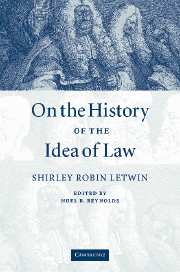Book contents
4 - St. Augustine
Published online by Cambridge University Press: 22 September 2009
Summary
Whereas in the ancient Greek tradition, there is a tension between law as a means of securing a peaceful communal life among individuals pursuing diverse purposes and law as a pattern for a good life, Augustine unequivocally denied that law is a pattern for goodness or an instrument of education. The question about whether peace or perfection is the proper purpose of law, which had before been merely an implicit issue in discussions of law, was made central by Augustine. It has since become, in somewhat different forms, peculiarly important in the modern discussion, and those who today deny that law is a moral pattern still give reasons which are in fact derived from Augustine, though seldom recognized as having this origin.
The tension between the two views of law (as an instrument of peace and an instrument of moral education) appears even within Augustine's own early writings because he initially accepted many of the classical ideas that he had discovered in Stoic thought and especially in Cicero. In these early writings, Augustine tended to speak of law, much as Cicero did, as one with a cosmic ordering principle manifest to men through their reason. He maintained that the lex temporalis is valid only if it is derived from or correctly embodies the eternal law, and that any legislation lacking this quality could not be just and therefore did not deserve the name of law.
- Type
- Chapter
- Information
- On the History of the Idea of Law , pp. 59 - 68Publisher: Cambridge University PressPrint publication year: 2005



